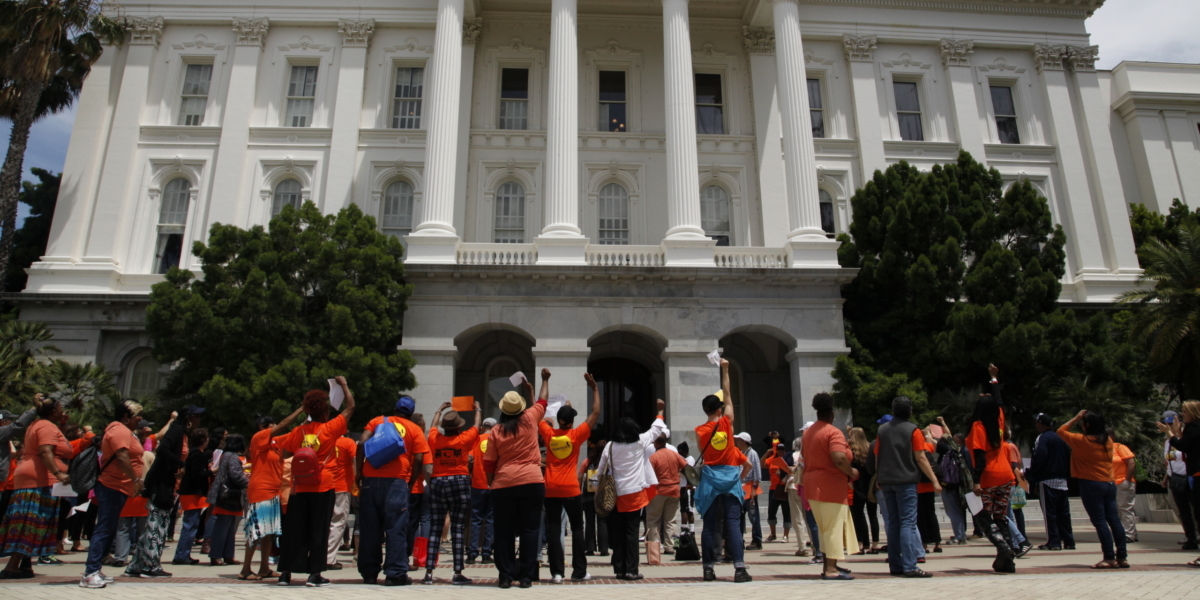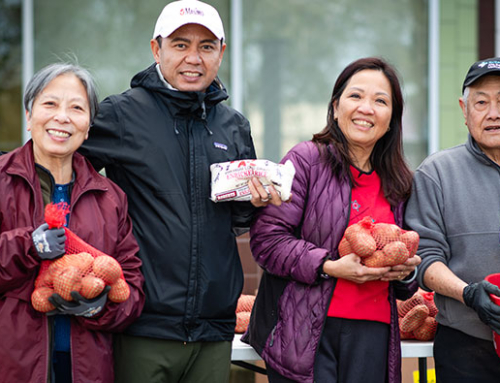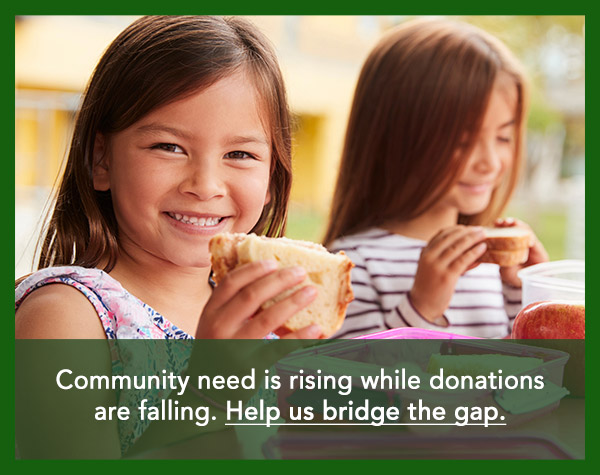By Ezer Pamintuan, Policy Advocate
“Hunger advocates we unite, standing up for human rights!”
ACCFB staff, volunteers, and community members were among the sea of people chanting in unison as we gathered in front of the steps of the State Capitol in Sacramento for Hunger Action Day 2017. After the rally, advocates from across California would head inside the building to meet with dozens of legislators, demanding action to end hunger and poverty.
It has been over two years since we have last been able to gather in Sacramento for an in-person day of action. But since then, not only has the underlying message of our chant remained the same, but we are proclaiming it louder than ever: Anti-hunger work is human rights work. Taking our role as human rights activists seriously in turn requires us to take a broad view of our mission and the work it demands.
This also requires addressing the root causes of hunger. Uprooting the systemic causes of hunger and planting new systems that are democratic, equitable, and inclusive is core to ACCFB’s mission as is distributing nutritious groceries.
In our last blog, our Community Organizers Henry Easton Koehler and Nick Musni wrote about their experiences talking to partner organizations about the burdens and obstacles community members are facing right now. In this blog, I will show how our legislative priorities are centered around removing the barriers that prevent equitable access to food as a human right.
Housing & Houselessness
With the high cost of living in the Bay Area, rental and housing burden is a primary factor in soaring rates of food insecurity. Among the 58 counties in California, Alameda County has the 7th highest cost of living. In 2019, Alameda County Community Food Bank’s partnership with the Urban Institute found that “food insecurity rates increase with prevalence of high rent burden among low-income households.” As the cost of housing increases, individuals and households don’t have much left over to pay for nutritious meals and groceries, medicine, child care, and other essential needs. It is deeply inequitable that people have to make this impossible choice. In response, we will adopt a grassroots approach by uplifting community voices to advocate for equitable access to housing and other essential resources.
Immigrant Inclusion in the Safety Net
Millions of Californians are unjustly excluded from participating in crucial nutrition programs solely due to their immigration status. These nutrition programs were intended to act as a “safety net” to protect people from falling into poverty. But our safety net is full of holes. To fix this, we will work with our partners in the statewide Food4All Coalition to expand immigrant inclusion in our nutrition programs. Our goal is to provide permanent funding for nutrition benefits to all Californians, including people ineligible for CalFresh solely due to their immigration status.
Tax Policy
Equity means the redistribution of power and resources. Tax policy is one of the most effective ways to transform the economy systemically and make it equitable. Building on our endorsement of Proposition 15 in 2020, which would have funded schools and community colleges by having some commercial properties pay a fairer share of property taxes, we will work at all levels of government to invest in schools and communities and win back hard-fought gains such as the Child Tax Credit. Since payments expired at the end of 2021, 3.7 million children have fallen into poverty — with an even higher rate for Black and Latinx children.
Democracy & Voting Rights
Addressing threats to equity cannot be done without uplifting community voice and power. To redistribute power and resources, we need a government that is accountable to everyone. That’s why ACCFB is committed to democracy as a value and practice. We will continue to call for reforms – including the abolition of the filibuster – that fully realize the value of democracy. In 2022, we will continue to mobilize the full Food Bank constituency around the Primary and General Elections. Our role as an organization is to amplify community voice — particularly voices of community members most affected by hunger and poverty — and to use elections as an opportunity to call attention to the issues identified by the community.
Our Role, and Yours
Our advocacy goals for 2022 are bold, ambitious, and necessary. While we will continue our work to expand food programs and other benefits that alleviate hunger and other symptoms of poverty, our expanded policy team now has the capacity and expertise to widen the scope of our work and address the systemic causes of poverty.
This journey is not one we intend to take alone. Our emphasis on community voice and power means we must engage in this work together. As our chant at Hunger Action Day confidently declared — “Hunger advocates we unite!” —by uniting in coalition with other advocates we will end hunger.
We ask you to unite with us. Hunger Action Week 2022 is just around the corner, from May 9 to 13. Join us in standing up (virtually) for the conviction that food is a basic human right.
- Visit accfb.org/advocacy to sign up for updates and alerts on how to become an advocate
- Reach out to advocate@accfb.org to learn more about Hunger Action Week.
- Be sure to follow us on Facebook, Instagram, and Twitter.
The movement to stand up for human rights is stronger with you in it.





